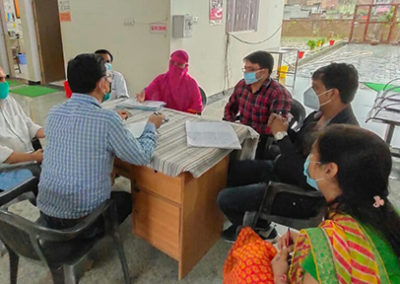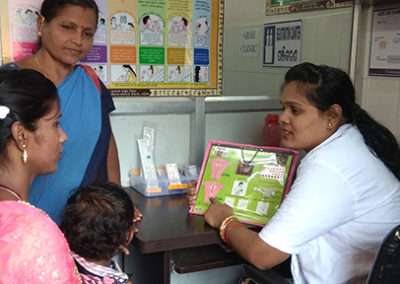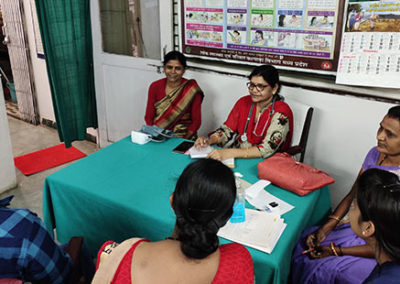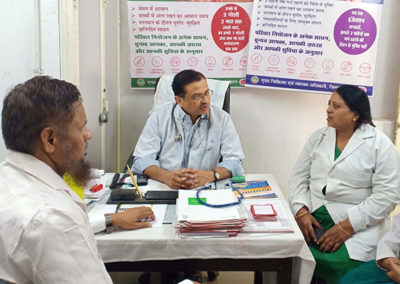India Toolkit: Services & Supply
- Home
- Help and Support
- Close
- Toolkits
- Global Toolkit
- AYSRH Toolkit
- Hub Toolkits
- Core High-Impact Practices
- Gender Essentials Mini Course
- Close
- Resource Collection
- Community of Practice
- Coaching
- Log In/Register
- My Profile
- English
Strengthening Systems to Ensure Quality Family Planning Services

An IUCD training demonstration.
Purpose: To help systematically assess existing mechanisms / systems to ensure continuous quality family planning (FP) services to the clients.
Audience:
- Chief Medical and Health Officers (CMHO/CDMO/CMO)
- District Quality Assurance Committee (DQAC) / District Quality Assurance Unit (DQAU) members, Chief Medical Superintendents (CMS)
- Urban Health and FP Nodal Officers
- Facility-in-Charges and Medical Officers in Charge (MOIC)
- District Program Managers (DPM)
- Urban Health Coordinator/Assistant Program Manager, NUHM
- Technical organizations (The Federation of Obstetric and Gynecological Societies of India (FOGSI), District Obstetrics and Gynecological Societies, India Medical Association (IMA) members, etc.
- Representatives of relevant NGOs
Background: Quality Assurance (QA) is a dynamic mechanism of objectively assessing and facilitating the conversion of inputs and processes into the expected outputs and outcomes with quality ultimately borne out by the client’s satisfaction. It includes all activities involved in “defining, designing, assessing, monitoring and improving the quality of healthcare”. QA is about preventing errors in healthcare service delivery by deploying a Quality Management System and prevention and safeguarding activities. The National Urban Health Mission (NUHM) launched in 2013, specifies dedicated attention and focus on bringing quality assurance in services including family planning services across all service delivery points including urban primary health center (UPHC).
The National Quality Assurance (NQA) program provides guidelines towards ensuring quality in family planning services. To ensure adherence to NQA standards, Quality Assurance Committees/Units are formed to monitor all types of facilities including district hospitals, urban community health centers (UCHC), and urban primary health centers (UPHC). They are mandated to objectively and systematically monitor and evaluate FP services as per GoI guidelines; resolve identified problems; and improve overall quality of services and client care.
The capacity of most of these QA Committees/Units needs regular strengthening and ongoing follow-up.
|
Structure of QA System in India’s Public Health Sector
|
The TCI tutorial below features a webinar held in May 2020 explaining TCI’s approach to bringing quality assurance to family planning service delivery.
Evidence of Effectiveness
Supported by the Government of India, Population Services International’s (PSI’s) Expand Access to Quality to Broaden Method Choice (EAQ) seeks to increase the use of long acting reversible contraception (LARC) and long acting permanent methods (LAPMs) by expanding choice and access among men and women residing in urban slums of 32 districts of Uttar Pradesh through private sector engagement. EAQ identified that an important criterion for private sector engagement is to ensure that the private sector facilities meet minimum standards as defined by national guidelines and have an accreditation certificate from an authorizing body, such as District Quality Assurance Unit (DQAU) & District Quality Assurance Committee (DQAC). However, it was found that the authorizing bodies at the district level were inactive in some places or functioning sub-optimally. Thus, under the EAQ project, DQACs/DQAUs were activated and formed wherever they did not exist.
The EAQ project implemented activities with 27 DQACs, which were activated in Uttar Pradesh from January 2016 to December 2017. Several meetings were organized, where quality-related issues and quality assurance plans for the districts were discussed. The remaining 48 districts received technical support in the form of guidance only to activate DQACs. These efforts resulted in 1,040 private facilities receiving accreditation by the government after DQAC visits and certification.
Guidance on Implementation of Quality Assurance (QA)
Continuous assessment of quality services provided by healthcare providers is fundamental to ensuring client satisfaction. The sub-committee of DQACU responsible for ensuring quality standards of family planning services is the Family Planning (FP) sub-committee. The following steps need to be carried out to ensure QA for family planning services in both public and private sectors.
The FP sub-committee would comprise of:
- District Magistrate (Chairperson)
- Chief Medical Officer/District Health Officer (Convener)
- District Family Welfare Officer/RCHO/ACMO/equivalent (Member Secretary)
- Empaneled gynecologist from public institutions
- Empaneled surgeon from public institutions
Identify if District Quality Assurance Committee Exists
If it does not exist, then form one by nominating members per the GOI guidelines (refer to the above box). Orient the members on their roles and also on the national family planning standards.
Develop a Plan of Action
Develop a plan of action per terms of reference (TOR) of the District Quality Assurance Committee, which can be found on page 17 of the MoHFW’s Quality Standards for the Urban Primary Health Center (2015). The plan should include the frequency of visits, quarterly meetings of the District Quality Assurance Committee, facility visit, client exit interview and observation of service procedures as per the TOR.
Ensure Implementation of the Plan & Follow-Up
Involve development partners working in the district in the QA process.
Conduct Sensitization Sessions
All facility service providers, including public and private doctors, should be engaged in QA sensitization sessions, with a focus on FP services.
Plan & Coordinate Interface Meetings
Meetings with private providers and key stakeholders in the government, including DQAC members, should be planned and carried out.
Conduct a Baseline Assessment
Involve different departments of a facility in a baseline assessment based upon the standard tool/checklist developed by the government (refer to the revised Kayakalp checklist, NQAS checklist for PHC).
Organize DQAC Meetings
Make sure DQAC meetings include a defined agenda. Make an action plan for structured visits of DQAC to the facilities, and develop plans for other QA activities. During the facility visits, ensure a regular facility audit is conducted by DAQC members related to the infrastructure and supplies, record review, procedure observation and client exit interview. If a facility meets the quality standards, then it is scored or certified/accredited (for private sector).
Regularly Monitor the Action Plan
Regularly monitor to see whether meetings, DQAC visits, and client exit interviews are occurring. Analyze the checklist completed by DQAC members to assess accuracy of steps being followed (see Quality Standards for the Urban Primary Health Center, MoHFW, 2015, page 53-55).
Regularly Share Observations
Share observations of the visit and audit findings in DHS or DQAC meetings.
Roles and Responsibilities
Role |
Responsibility |
| CMHO/CDMO/CMO/CS |
|
| Nodal Officer |
|
| Facility/Medical Officer-In-Charge |
|
Monitoring Benchmarks Management
The CMHO/CDMO/CMO/CS with assistance from the Nodal Officer Urban Health and FP / DPM or other team members should regularly monitor the following indicators:
- Frequency of quality team meetings and other activities at facility level
- Number of urban health facilities including UPHC and urban private accredited facility visited at least once by DQAC members annually
- Number of facilities meeting quality standards
- Monthly and quarterly review of physical and financial progress of all approved FP activities
- In case of adverse event/death/complication, immediate reporting – maximum up to 24 hours to DQAC.
- Ensure reporting to SQAC in case of adverse event
Facility Level
Cost Elements
financial support for these activities under Quality Assurance (FMR Code 13), which comprises of Quality Assurance (FMR Code- 13.1), Kayakalp (FMR Code-13.2) and other activities (13.3). The table below illustrates the manner in which cost elements are provisioned in the government PIP, thus providing guidance on where to look for elements related to particular task for quality assurance.
| Cost Elements | FMR Code |
| Quality Assurance | 13.1 |
| Quality Assurance Implementation (for traversing gaps) | 13.1.1 |
| Quality Assurance Assessment (State & district Level assessment cum Mentoring Visit) certification & recertification (State & National Level) | 13.1.2 |
| Miscellaneous Activities (incentives only) | 13.1.3 |
| Any other (please specify) | 13.1.4 |
| Kayakalp | 13.2 |
| Assessments | 13.2.1 |
| Kayakalp Awards | 13.2.2 |
| Support for Implementation of Kayakalp | 13.2.3 |
| Contingencies | 13.2.4 |
| Swachh Swasthya Sarvatra | 13.2.5 |
| Any other (please specify) | 13.2.6 |
| Any other activity (please specify) | 13.3 |
| IEC activities under Mission Parivar Campaign | 11.6.5 |
| Dissemination of family planning manuals and guidelines | 12.3.1 |
| Printing for Mission Parivar Campaign | 12.3.2 |
| Processing accreditation/ empanelment for private facilities/providers to provide sterilization services | 15.1.1 |
| Family planning QAC meetings | 16.2.3 |
Source NHM PIP Guideline, 2018-19
Sustainability
Linking costs of quality assurance activities to PIP and PIP resource mobilization tool is the key to making these activities sustainable. After action plan is developed (step 3), subsequent assessments by various stakeholders – facility in charges, district health administration, state and external certification body – would need to be undertaken using the same tools, so that there is clarity on expectations and objectivity in the assessment is maintained. This ensures in-house ownership, which is important for sustainability of any quality assurance Initiative.
Discussion of the planning and regular monitoring of these activities in the monthly CMO/CMHO/CDMO meetings is another important step toward institutionalization and sustainability of these quality assurance activities. Regular and strict monitoring of QA of accredited private sector facility is importance for long-term sustainability.
Broadly focus on facility-based interventions and involve technical organizations and development partners to further ensure sustainability.
Disclaimer: This document is based on the learnings collated from Urban Health Initiative, Health of the Urban Poor (supported by USAID) and Expanded Access and Quality (EAQ) to broaden method choice in Uttar Pradesh. This document is not prescriptive in nature but provides overall guidance of how this particular aspect was dealt with in these projects for possible adoption and adaptation.
TCI APP USERS PLEASE NOTE
You will only receive CERTIFICATES by email – when earning a score above 80% – and will not be able to view or print a certificate PDF from the TCI app.
Test Your Knowledge
Earn a Certificate
Quiz Summary
0 of 5 Questions completed
Questions:
Information
You have already completed the quiz before. Hence you can not start it again.
Quiz is loading…
You must sign in or sign up to start the quiz.
You must first complete the following:
Results
Results
0 of 5 Questions answered correctly
Your time:
Time has elapsed
You have reached 0 of 0 point(s), (0)
Earned Point(s): 0 of 0, (0)
0 Essay(s) Pending (Possible Point(s): 0)
Categories
- Not categorized 0%
- 1
- 2
- 3
- 4
- 5
- Current
- Review
- Answered
- Correct
- Incorrect
-
Question 1 of 5
1. Question
Quality Assurance is essential to ensure client satisfaction.
CorrectIncorrect -
Question 2 of 5
2. Question
A Family Planning Sub-Committee responsible for ensuring quality standards of FP services would comprise of:
CorrectIncorrect -
Question 3 of 5
3. Question
Linking costs of quality assurance activities to PIP ensures sustainability.
CorrectIncorrect -
Question 4 of 5
4. Question
How useful did you find the information and/or tools presented on this page? Please write your response in the box below using one of the following phrases: Very useful, Useful, Somewhat useful, Not useful.
Feel free to comment on why you made that choice.
-
This response will be awarded full points automatically, but it can be reviewed and adjusted after submission.
Grading can be reviewed and adjusted.Grading can be reviewed and adjusted. -
-
Question 5 of 5
5. Question
How do you intend to use the information reviewed and/or tools that you accessed?
-
This response will be awarded full points automatically, but it can be reviewed and adjusted after submission.
Grading can be reviewed and adjusted.Grading can be reviewed and adjusted. -
Service Delivery Approaches
Government of India Resources
- Quality Standards for the Urban Primary Health Center, MoHFW, 2015
- Standards & Quality Assurance in Sterilization Services, GoI, Nov 2014
- Standards & Quality Assurance in Sterilization Services, Frequently Asked Questions, GoI, March 2016
- Reference Manual for Female Sterilization, GoI, Nov 2014
- Reference Manual for Male Sterilization, GoI Oct 2013
- Maternal and Newborn Health Toolkit, GoI, Jan 2013
- Supreme Court order 2016 for Family Planning services
- Extension of Kayakalp Guidelines in urban areas
- Revised Kayakalp Guideline-Award to Public Health Facilities, Kayakalp, GoI, Aug 2016
- NQAS checklist for PHC, NHM
- Swachh Swasthya Sarvatra, MoHFW & MDWS, 2016
- NHM PIP guideline, 2018-19: Quality Assurance Annexure







